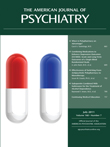Alcoholism is a complex disorder with multifaceted symptoms involving multiple neural-behavioral systems. Thus, it is not surprising that multiple treatment approaches have been reported to improve outcomes. Evidence is accumulating that matching treatment to patient problems leads to better outcomes. This was shown in a prospective randomized study (
1) in which treatment was applied to specific problems measured at intake by the Addiction Severity Index (
2). Unfortunately, most treatment programs provide the same treatment to all patients, even though their program advertisements might say otherwise (
3).
Adapting treatment to specific problems can also be approached by selection of medication. Last year in the
Journal, Pettinati and colleagues (
4) reported on combining medications for patients suffering from both alcoholism and major depression. This is a very common combination of problems, and it has been approached with different kinds of antidepressant medication. In a placebo-controlled trial, Pettinati et al. tried a combination of two medications, one for heavy drinking (naltrexone) and the other for depression (sertraline). The patients receiving the combination showed significantly more clinical improvement both in depression and in drinking behavior than those receiving either medication alone.
In this issue, Anton and colleagues (
5), again acknowledging the multifaceted symptoms of alcoholism, report the effect of adding gabapentin to naltrexone in the postdetoxification period. The naltrexone-gabapentin combination makes excellent pharmacological sense, and it is likely to be safe because naltrexone has no significant interactions with any class of drugs other than opioids. During the immediate postdetoxification period, symptoms that can be described as “protracted withdrawal” are prominent in many patients and may cause treatment dropout or relapse to drinking. Naltrexone has not been found to have any effect on such symptoms. Clinicians have always been tempted to add other medications for symptomatic treatment of irritability, insomnia, and anxiety early in alcoholism treatment, and gabapentin seems to be a logical choice. It has already been shown to reduce the symptoms of acute alcohol withdrawal in a controlled study (
6).
But Anton et al. went beyond the usual open clinical experimentation. They tested their hypothesis in a double-blind trial with the addition of either gabapentin or placebo to naltrexone. During the first 6 weeks of the study, the addition of gabapentin to naltrexone produced a longer delay to relapse, fewer drinks per drinking day, and a decrease in alcohol craving. As expected, the gabapentin group reported fewer sleep problems than the other two groups, which is consistent with reports of gabapentin's benefits for alcohol withdrawal.
The Anton et al. study is a fine example of clinical research guided by clinical experience and shows that medication combinations can indeed be objectively evaluated. Their study deserves replication, perhaps adding a gabapentin-alone treatment arm, as the authors suggest. Another variable to be considered in a replication study is the dosage of naltrexone. The recommended daily dose of 50 mg was arrived at in 1983 by convenience, as this was the dosage used in the treatment of heroin addiction. More recent studies, such as Project COMBINE (
7) and the above-cited study using an antidepressant and naltrexone (
4), have used 100 mg per day.
Most importantly, the Anton et al. study provides guidance to clinicians who are faced with a patient who has multiple chronic withdrawal complaints during the course of naltrexone treatment for alcoholism. This is an important problem that often leads to dropout and relapse to heavy drinking. Clinicians are known to add medications for symptomatic treatment in the absence of controlled data. While a single study does not provide adequate proof, the high quality of Anton and colleagues' study provides support to desperate clinicians seeking a way to retain the patient in treatment. We can also hope that a replication study is already in the planning stage.

